The Shower Routine That Experts Recommend

Are You Following the Same Shower Routine as Recommended by These Experts?
If its two things we know for sure about showers – they are a) We all should take a shower at least once a day; and b) Showers are relaxing. But beyond that, we normally don’t give much thought to a shower, let alone a shower routine worth exploring.
You stand under the shower, lather your body, and let the water drain down the dirt and bacteria. Seems simple right?
However, did you know that certain long-held routines of ours can actually cause a lot of skin problems – like washing your face in the shower before washing your hair, or taking a long hot shower. Puzzling isn’t it?
And what if we were to tell you that there is actually a right way to go about showering that, not only makes you feel absolutely clean & fresh, but also puts you on the track to healthy, shining hair and glowing skin?
So here come these expert-recommended tips that will put a spin on your shower routine, for all the right reasons.
· Brushing Your Hair Before Shower

Before hopping into a shower, brush your hair properly to remove tangles. We normally tend to have the urge to rake our hands through wet hair while showering. As a result, we end up with a good chunk of loose hair at our hands as wet hair is more prone to damage and breakage. So the next time before heading for a shower, take note to de-tangle your hair.
Edward Tricomi, a master stylist, and co-founder of Warren-Tricomi Salons recommends using Plastic vent brushes as they have multiple bristles to de-tangle. He advises on starting at the bottom while working your way up to the roots of your hair.
· Quick and Warm Showers
When we talk about showers, our first thoughts rush to a steamy bath that is way too hot and long. Though it may feel great, dermatologists warn against taking hot showers as they deprive the skin of the intrinsic natural oils and lipids which protect our skin and keep it moist.

“Warm water is best for a shower to be comfortable without drying out the skin. Avoid using very hot water because it strips the skin of its natural oils."
Instead, opt for lukewarm water or warm water that will help cleanse your skin but not provoke it.
Similarly, long showers can be again harmful by robbing your skin of its necessary oils and moisture. If you are taking two showers a day, limit the time to 5-10 minutes.
This brings us to the next question. How many times should I wash my hair? Experts state that it mostly depends on your type of hair. Some may require constant showers to prevent dandruff build-up while others work well with showers twice a week.
To sum up in the words of Rajani Katta, MD, and professor of dermatology at the McGovern Medical School, “Temperature extremes, whether too cold or too hot, can cause skin irritation and inflammation. Ideally, you’ll want to use lukewarm temperatures and limit showers to no more than 10 to 15 minutes.”
· The Art of Shampooing

Many of us reach for the shampoo bottles immediately after hopping into the shower and add a blob of it right on top of our wet heads.
However, experts advise on rinsing your hair thoroughly under clear warm water for at least a minute before shampooing. This will aid in loosening up any residual dirt and oil while also prepping your hair for the next step.
When it comes to shampooing, do not directly squirt the product on top of your head and start rubbing, instead apply a dollop into your hands and lather it up, applying evenly across your head through a back and forth motion.
Massage your scalp gently with your fingertips concentrating especially on the nape of your neck, as it is one of the oiliest regions. This is mainly important for women who have long hair, as the nape of the neck is often ignored. Massaging also helps in stimulating hair growth, so spending an extra 30-60 seconds won’t hurt.
Dermatologist Sandy Johnson repeats on how good a scalp massage can be but cautions to use only fingertips and not nails as they can scratch the scalp and cause flaking.
With your scalp washed, gently spread the lather down to the tips of your hair and rinse it off completely. While working on ends, do not rub them too harshly as it causes damage like split ends and frizzy hair.
· Conditioning Your Hair The Right Way
Applying conditioner after using shampoo is pretty important as it has a lot of benefits. Conditioners work great in protecting your hair ends while also making them look smooth. Even if you’re running late, do not skip this step. So how do you go about conditioning your hair?
After rinsing your hair, softly squeeze the excess water out of your hair and take a dollop of conditioner and smoothen it over your hair ends.
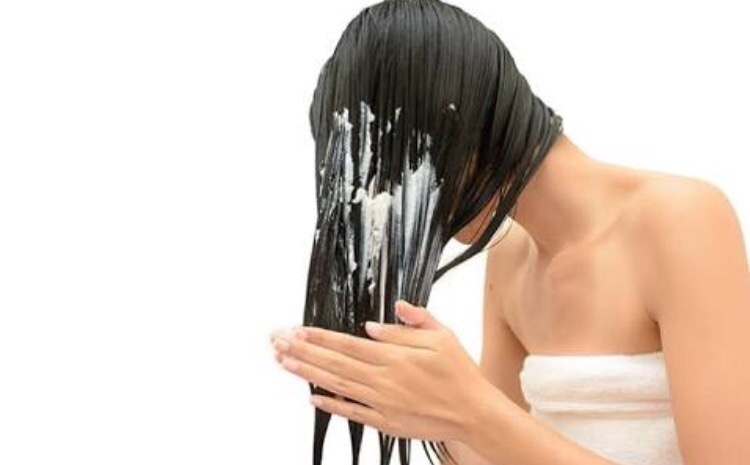
With your hair tips already swollen from being in the shower, they will readily benefit from the conditioner which forms a protective layer over the tips. Also, you can easily rinse out the conditioner with just a few washes. Since conditioners work almost instantly, leaving it longer won’t make a difference unless it is a deep mask or so.
There is another question that keeps popping up regarding conditioners. Should it be applied on hair tips alone or can it be used for the scalp?
Though Dermatologist Johnson suggests that conditioner can benefit your scalp, many agree on using conditioner for tips alone as they may give an oily look when used on the scalp. Hair stylist Edward recommends using a deep conditioner or hair mask once a week for best results. We say this is an excellent tip for the best shower routine for healthy hair.
· Cleansing Your Body

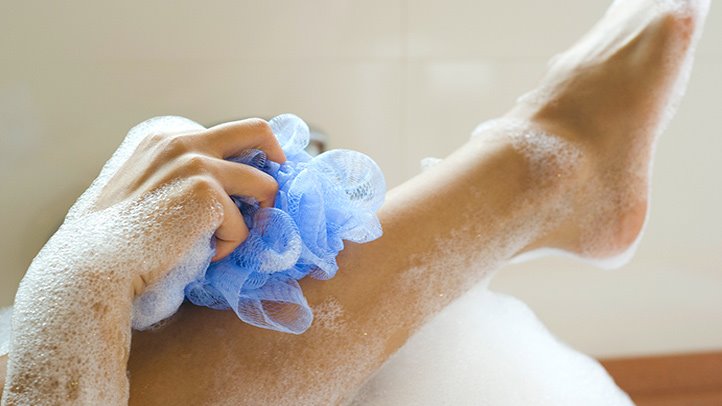
Experts are divided in their opinion about bar soaps and body wash liquids. While all agree that they are more sanitary than loofahs, some highlight that soaps lead to irritation and drying up of your skin robbing it of essential oils.
Then there are others like Dr. Katta who state that the body washes have a lot of preservatives and chemicals which may cause allergic reactions. So, the magic is figuring out on what works best for your skin.
A safe bet would be opting for cleansers as stated by Dr. Doris Day, a board-certified dermatologist in New York, who recommends products labeled as cleansers. She says, "Cleansers can add the moisture back into your skin.”
You can go for hydrating cleansers like Kiehl’s Crème de Corps Nurturing Body Washing Cream or The Body Shop Cocoa Butter Creamy Body Wash, etc.
No matter what you choose, remember to wash your body properly especially concentrating on your underarms, skin folds, feet, and nether regions.
Also, irrespective of your choice of body cleansing product, the one thing that you can always count on is The ShowerGem shower caddy. It not only holds all your shower essentials in one place, but also get your bathroom organized without hassles.
You can get yourself the best rustproof shower caddy for a fraction of the cost of a metal caddy; and your bathroom will love you for it! With place to hold your shampoo, conditioner, cleaner, soap, a loofah, razors, and more, you can magically organize your bathroom with a shower shelf such as this.
· Don’t Scrub Too Much
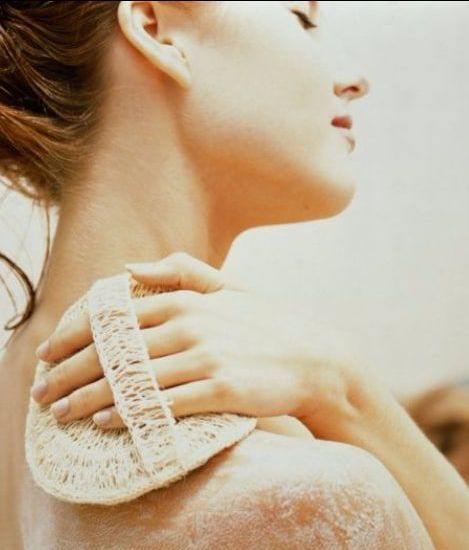
Exfoliating is good for your skin removing dead cells and encouraging new cell growth. But it is equally important to not go overboard as it can cause irritation. Dr. Tanzi recommends exfoliating once or twice a week while also cautioning to not go aggressive with body scrubs.
Dermatologist Mona Gohara cautions about loofahs, stating people may use it very harshly against their skin which may strip the natural protective barrier. Instead, she advises on using a cotton baby washcloth or just your hand.
Also remember to properly wash your loofah or washcloth after every use. Given the warm and damp environment of your bathroom, these become the breeding ground for bacteria, fungi, yeast and a whole set of unpleasant things.
· Wash Your Face in the Sink
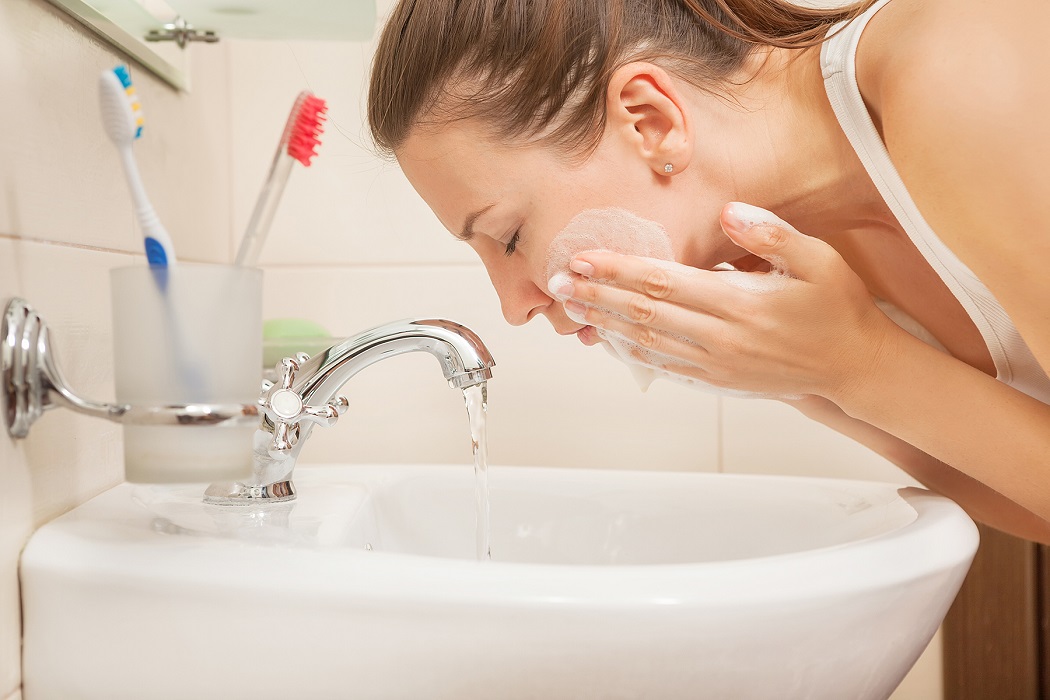
Normally we are extra protective when it comes to our face – from taking care in selecting the best facial products to using them the right way. So how does it figure in the whole shower routine?
Experts state that washing your face at the end of the shower could be your best bet. Because firstly, products that you used for your hair or shaving, be it a showering gel or a body wash can still linger on your face and cause irritation. Like how Dr. Justine Hextall, consultant dermatologist and Fellow of the Royal College of Physicians, UK, explains "They foam up the oil on your skin and rinse it away, raising the pH and causing dry skin.”
This is why dermatologists encourage on stepping out of the shower and washing your face in the sink with cleansers. They can be slightly oily, acidic or creamy to get rid of any remaining bubbles or foam from the body wash or shampoo like Dermalogica Ultra Calming Cleanser.
Secondly, after a hot steamy shower, the pores on your face would be open which will allow the cleanser to penetrate deep into your skin and clear acne-causing sebum. Once done, splash cold water on your face to close the pores as open pores can allow bacteria to enter. You can’t go wrong with this shower routine for smooth skin.
· Pat yourself Dry & Moisturize
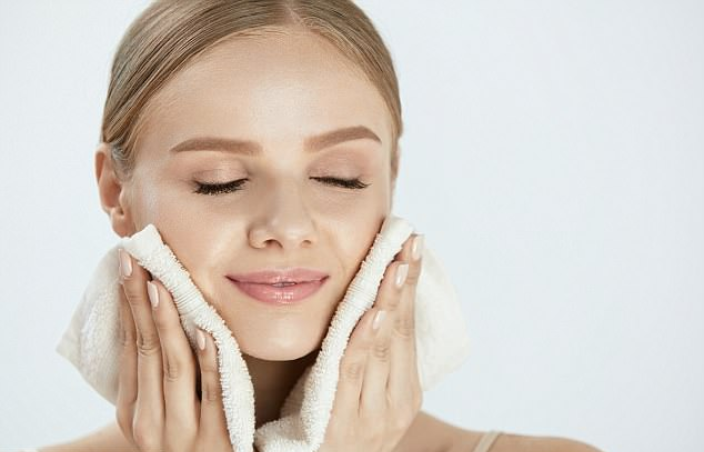

Now that you have taken a hearty shower, the next step is to dry your body without losing moisture. This doesn’t mean that you rub yourself with a towel, as the action can cause irritation and itchiness.
Instead, pat yourself dry leaving your skin a little damp. But do concentrate on drying specific areas such as on skin folds, between toes, underarms, etc., to prevent future infections or rashes. After that, immediately apply moisture as it can help lock in water into your skin and nourish it. Besides, your skin is very receptive with its pores opening up under hot steam which readily will utilize the benefits of a moisturizer or lotion.
Furthermore, Dermatologists agree on moisturizing your skin at least twice a day, especially during winters.
Dr. Katta advises on using thick formulations such as those that come in tubes or ointments instead of pump bottles. Petroleum jelly is also said to reduce water loss from the skin while ingredients like dimethicone, ceramides, hyaluronic acid, and glycerin can aid in locking moisture.
According to Dr. Jessica Krant, fragrance-free products are better for your skin. For dry skin, she recommends moisturizers that contain ceramides or alpha-hydroxy acid over lotions.
To sum up, one can say showering the right way can help reduce a lot of health and skin problems which we face quite often. With these pointers and recommendations from experts, you can now enjoy a shower routine that is equally relaxing and benefitting. Happy showering!!